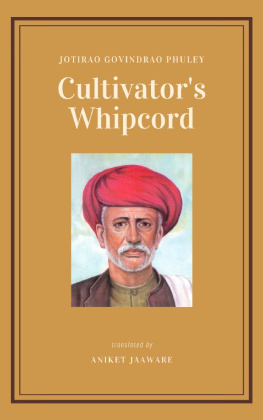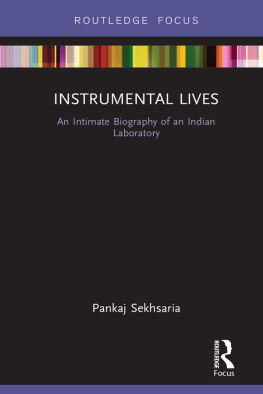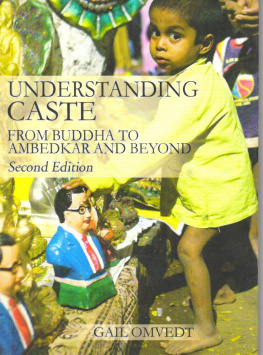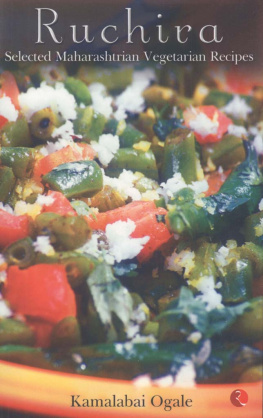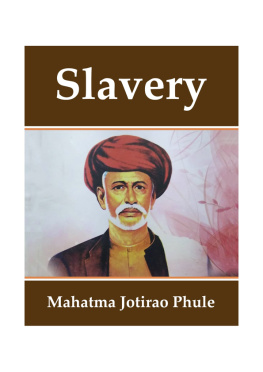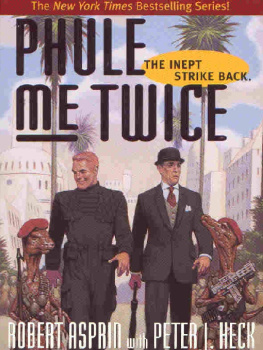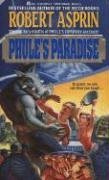Cultivators Whipcord
AprilJuly 1883
Translated by Aniket Jaaware
Cultivator's Whipcord (Shetkaryacha Asud) was written in 1883 but the publication of the entire text was delayed because, as Phule put it, We the Shudras have amongst us cowardly publishers. Nor was it written at one go. Phule did public readings of the various chapters of the book as they got written.
Aniket Jaavare, our translator, had proposed whiplash as a translation for Asud. However, Phule himself preferred Whipcord, and that is what we have retained.
Asud and Gulamgiri, between them, sum up Phule's political and economic philosophy and define his historicist understanding of the varna system. Phule believed that Maharashtrian Hindu society was made of two groups, the Brahmins and the Shudratishudras. This two-fold division and the historical tension between the two is central to his thought. Here we see Phule analysing history, mythology, language, the social struggle at the core of Maharashtrian society, revolutionary change and its appropriation by the dominant class, in this case the Brahmins. Even if one were to read only these two books, one would get the essence of Phule's thought and system.
Table of Contents
Opinion from Jotteerao Govindrao Phulay
on Note No. I, by Mr. B.M. Malabari on Infant Marriage in India
Opinion from Jotteerao Govindrao Phulay
on Note No. II, by Mr. B.M. Malabari on Enforced Widowhood
Cultivator's Whipcord
by
Jotirao Govindrao Phuley
for the defence of the Shudra (Dasya) Community
For the kind consideration of
His Excellency the Right Hon 'ble
Sir Frederick Temple Hamilton Temple Blackwood,
Earl of Dufferin,
K.P., G.C.B., G.CM.G, F.R.S.D.C.I.,
Viceroy and Governor General of India.
Contents
Because the Brahmin workers are dominant in all the departments of the government, through their selfish relations, Bhat and Brahmins so exploit the ignorant farmer in the name of their greedy religion, that the farmer is left without any means of sending his little ones to school. And even if some such one has the means, because of their ill advice, he is without the wish to do so.
Because the white government officers are mostly engrossed with luxury, they do not have time enough to enquire into the real conditions of the farmers, and because of this negligence most government departments are dominated by Brahmin employees. Both these causes have the effect that the farmers are looted and are without enough to fill their bellies or cover their bodies.
How the Arya Brahmins came from Iran, the origins of the Shudra farmer, how our current government is forever introducing new taxes on the farmer and schemingly collecting money to increase the salaries and pensions of its own employees and how the farmer is now totally debt-ridden.
The condition of agriculture, with that of the farmer.
Suggestions for the Arya Bhat-Brahmins regarding us Shudra farmers, and the measures that the government should take.
While I was working on this Whipcord many people spoke to me on the proposed book. I present here two typical examples
- The one who calls himself a Pure Maratha
- A Shudra sadhu
Prologue
Without knowledge, intelligence was lost, without intelligence morality was lost and without morality was lost all dynamism! Without dynamism money was lost and without money the Shudras sank. All this misery was caused by the lack of knowledge.
What we mean is, there are many causes for the abjection of Shudra farmers, relating to religion and state, and we have written this book with the intention of discussing some of them at least. Because of an artificial and tyrannical religion, and because almost all the government departments are dominated by Brahmins, and because the European workers are lazy, the Shudra farmers are ill-treated by the Brahmin workers. Our intention is that they should be assisted in defending themselves from these, and therefore we have titled this book as The Cultivator's Whipcord.
Dear Readers, at present, farmers can be divided into three groups - pure farmers or Kunbis, Malis and Dhangars. Now if we look at how this division came about, we find that originally there were people who depended on farming for their livelihood. These are the kulavadis or Kunbis. Gradually there emerged people who worked on their farmlands and in the process diversified into cultivating fruits and vegetables. They became the gardeners or mlis . Then there emerged a third group who did both of these and possessed goats etc. They became the Dhangars or shepherds.
These differences must have come about because of differences in work. But now these are thought to be three separate castes. At present there is no inter-marriage between these, but there is inter-dining and other relationships. Therefore these (Kunbis, Malis and Dhangars) must have been in the past of a single and same Shudra farmer caste. Later people from all the three castes had to give up their original business of farming and took up various businesses for their livelihood. Those who have some energy, have continued to be farmers, though most of them are illiterate God-believers, naked and forever hungry; and those who were totally supportless have left their areas and sought business here and there, wherever they could find it. Some have started a fodder-business, some of wood, some of cloth, and some others have started taking contracts, others to be employed as writers, and finally are proud of themselves with their pensions. Thus they earn money and build estates. But after them, their cavalier sons, who have little love of knowledge, become penniless in no time and blame their fathers (for not having left behind enough). Many there are whose ancestors won whole jgirs and inms on the strength of their soldiery or their wit, and some indeed had become parallel kings like Shinde and Holkar. But at present their descendants, ignorant and illiterate, have either pawned their jgirs and inms , or sold them off outright and are in debt, and many there are, who are penniless and without food. Most inmdars and jgirdars have no conception of the various adventures and achievements of their ancestors or of their various sufferings, and because they are ignorant and in the company of selfish and cunning men and because they are indulging day and night in luxury and addictions, it has become rare to find those whose jagirs are not pawned off and those who are not entirely possessed by debt. Now even among those samsthniks who have no debts and liabilities, the people around them and their Brahmin administrators are so selfish, cunning and political that they prevent the sansthniks from acquiring a taste for virtue and knowledge; they are content to believe that their ancestors created this wealth only for their enjoyment. Blinded by religion and incapable of governing their kingdoms on their own, they throw their lot in the hands of fate and depend entirely on their Brahmin administrators; and generate virtue by donations of cow during the day, and progeny by night. It is especially possible for such kings and lords to improve the lot of their Shudra brothers, but they never think of it and as long as the stupidity of believing that 'the Brahmin is the one I worship' ( brahmano mama daivatam ) does not leave their heads, however much we might break our heads over it, it would be futile; and even if after this someone is prompted to do so (improve the lot of their brothers that is), how would they listen to any ideas which go against the selfish religion which has been firmly implanted in their minds from childhood, and think about them? And the administrators close to them will not allow such a selfless person to do anything. But if someone is courageous enough to give me some time and let me explain according to my wit, I will happily present my ideas to him.
Next page
